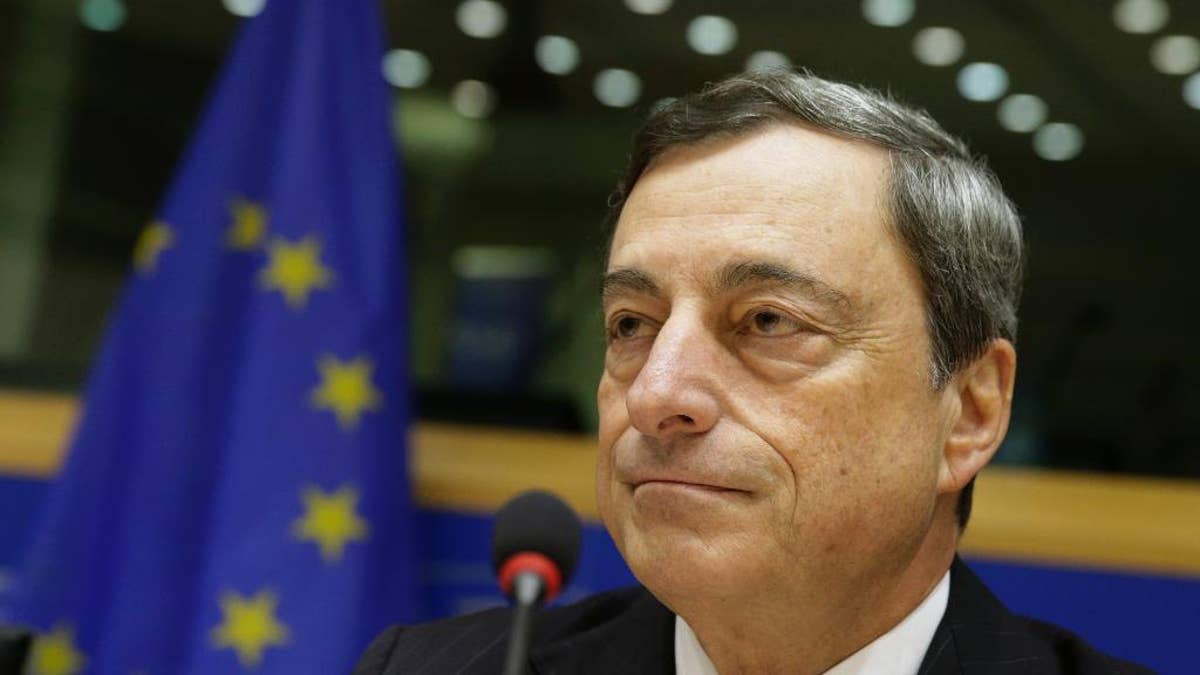
President of the European Central Bank Mario Draghi addresses the Committee on Economic and Monetary Affairs, at the European Parliament building, in Brussels on Monday, Nov. 17, 2014. (AP Photo/Yves Logghe) (The Associated Press)
FRANKFURT, Germany – Japan's return to recession has renewed questions about the effectiveness of its recent monetary stimulus — and how anything similar would help Europe's struggling economy.
The European Central Bank is edging toward the same kind of large-scale bond purchases that the Bank of Japan has used. Proponents say the measure, typically used as a last resort by central banks, could boost the shaky eurozone recovery by reducing borrowing costs for businesses, households and governments.
Yet Japan's recession underlines the limits of so-called quantitative easing, or QE, which involves pumping newly created money into the economy through bond purchases.
The step may give the eurozone a marginal boost by keeping the euro's exchange rate down, putting a lid on borrowing costs for the foreseeable future and generating some wealth effects.
However, few economists think it will provide a magic solution — especially if governments like those in France and Italy don't make their economies more business-friendly, and if countries keep trying to reduce debt through austerity cuts.
"The Japanese experience gives a very strong indication that if there is not enough demand sparked by fiscal policies or by structural reforms in the labor markets, it is very hard to see how monetary policy alone can achieve a reduction in unemployment," said Michael Koetter, a professor at the Frankfurt School of Finance and Management.
In Japan's case, proponents of bond-buying say the country's fall back into recession is due mainly to an ill-timed sales tax that hurt consumer spending. The U.S. Federal Reserve and Bank of England have also done bond-buying, and seen their economies rebound.
After the ECB this summer cut rates and launched programs to increase bank lending to companies, it says it is ready to also consider such large-scale government bond-buying. President Mario Draghi confirmed that Monday. The ECB's next policy meeting is Dec. 4, although analysts think that if the ECB goes ahead it may do so early next year.
The ECB has held off in part because it's harder to carry out such a program in a bloc with 18 members. The measure also faces opposition in Germany, where some fear it may reduce countries' incentives to reform and expose taxpayers to potential losses.
Still, many say the ECB is running out of options.
"This revival has already peaked," said Jean-Michel Six, chief European economist for ratings agency Standard & Poor's.
GET THE EURO DOWN
The most immediate impact of speculation that the ECB could start buying governments bond has been the sharp fall in the euro, particularly against the dollar. It's down from near $1.40 in May to around $1.25 now. It's classic demand and supply — having more euros in circulation as a result of bond-buying would dilute the currency's value.
The lower euro is already a potential positive as it makes the region's exports cheaper, providing a boost to growth.
A program like QE would likely keep that pressure on the euro, providing a longer-term economic boost. And a falling euro could have an additional positive impact by raising import prices. Concern that prices could start falling in the eurozone has driven the ECB's recent activism — the central bank aims to keep inflation at just below 2 percent. Inflation is now only an annual 0.4 percent.
Falling prices sound good but in reality could further weigh on the economy as consumers delay purchases in the hope of bargains down the line and businesses put off investments.
A MATTER OF TIMING
If it were to start QE, the ECB would be doing so under very different conditions than those under which the Fed acted. It embraced the policy as a way of preventing the recession in the U.S. from becoming an outright 1930s-style depression after the U.S. economy, like others, slumped in the wake of the 2008 financial crisis.
The Fed's stimulus helped drive down market interest rates. Growth rose and unemployment fell.
Yet many rates in the eurozone have already fallen to record lows. That decreases the impact of bond-buying.
Proponents of bond-buying say it's still worth trying, they say, especially as the Fed is expected to start raising rates next year. Higher yields on U.S. Treasurys are expected to have a knock-on effect, lifting market rates around the world. A European QE program now, according to S&P's Six, could help "limit the contagion."
WEALTH CREATION
Proponents say government bond-buying could help by making people feel wealthier, which would deliver a much-needed boost to consumer spending in an economy weighed down for years by two recessions, sky-high unemployment and austerity.
QE implies the creation of new money, which often ends up swirling around financial markets and chasing assets from stocks to real estate.
For many, the rise in U.S. stock markets to record highs from their 2009 troughs is largely due to the stimulus money.
While S&P's Six cautioned that the U.S. experience cannot be exactly replicated in the eurozone and that wealth effects will be "uneven," he said they shouldn't be underestimated. In countries where housing has taken a hit over the past few years, such as the Netherlands, a QE program could boost consumption, he said. Six also said it could help Spain's battered property market.
"Risks of a triple-dip recession have increased," said Six. "The ECB has one last arrow and that is quantitative easing."
---
Pylas reported from London.
